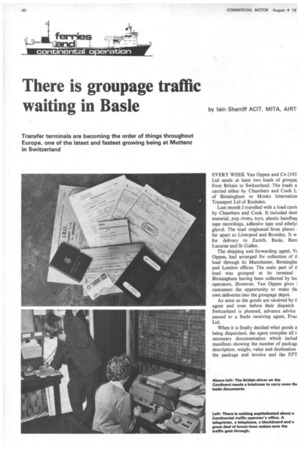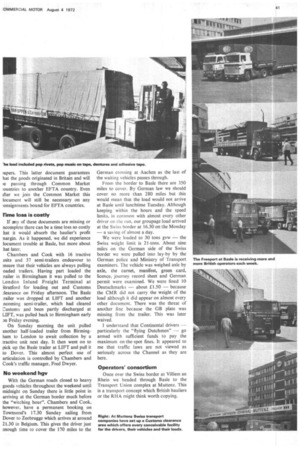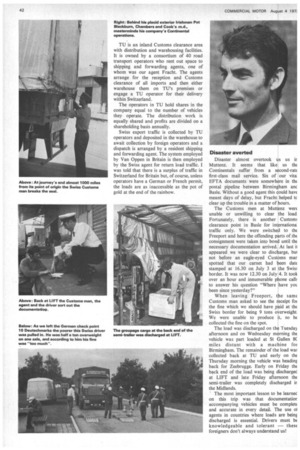There is groupage traffic waiting in Basle
Page 42

Page 43

Page 44

If you've noticed an error in this article please click here to report it so we can fix it.
Transfer terminals are becoming the order of things throughout Europe, one of the latest and fastest growing being at Muttenz in Switzerland EVERY WEEK Van Oppen and Co (193 Ltd sends at least two loads of groupal from Britain to Switzerland. The loads a carried either by Chambers and Cook L of Birmingham or Monks Internation Transport Ltd of Rushden.
Last month I travelled with a load card( by Chambers and Cook. It included dent material, pop rivets, toys, plastic handbag tape recordings, adhesive tape and ethelyi glycol. The load originated from places . far apart as Liverpool and Bromley. It w. for delivery to Zurich, Basle, Bern Lucerne and St Gallen.
The shipping and forwarding agent, V; Oppen, had arranged for collection of ti load through its Manchester, Birmingha and London offices. The main part of tl load was grouped at its terminal Birmingham having been collected by loe operators. However, Van Oppen gives i customers the opportunity to make th( own deliveries into the groupage depot.
As soon as the goods are received by ti agent and even before their dispatch Switzerland is planned, advance advice passed to a Basle receiving agent, Frac Ltd.
When it is finally decided what goods a being dispatched, the agent compiles all ti necessary documentation which includ manifests showing the number of packag( description, weight, value and destination the package and invoice and the EFT papers. This latter document guarantees hat the goods originated in Britain and will )e passing through Common Market :ountries to another EFTA country. Even titer we join the Common Market this locument will still be necessary on any !onsignments bound for EFTA countries.
nine IOSS is costly If any of these documents are missing or ncornplete there can be a time loss so costly hat it would absorb the haulier's profit nargin. As it happened, we did experience locument trouble at Basle, but more about hat later.
Chambers and Cook with 16 tractive mits and 37 semi-trailers endeavour to :.,nsure that their vehicles are always pulling oaded trailers. Having part loaded the railer in Birmingham it was pulled to the London Inland Freight Terminal at 3tratford for loading out and Customs 11earance on Friday afternoon. The Basle sailer was dropped at LIFT and another ncoming semi-trailer, which had cleared Customs and been partly discharged at LIFT, was pulled back to Birmingham early Dn Friday evening.
On Sunday morning the unit pulled another half-loaded trailer from Birmingham to London to await collection by a tractive unit next day. It then went on to pick up the Basle trailer at LIFT and pull it to Dover. This almost perfect use of articulation is controlled by Chambers and Cook's traffic manager, Fred Dwyer.
No weekend hgv With the German roads closed to heavy goods vehicles throughout the weekend until midnight on Sunday there is little point in arriving at the German border much before the "witching hour". Chambers and Cook, however, have a permanent booking on Townsend's 17.30 Sunday sailing from Dover to Zeebrugge which arrives at around 21.30 in Belgium. This gives the driver just mough time to cover the 170 miles to the German crossing at Aachen as the last of the waiting vehicles passes through.
From the border to Basle there are 350 miles to cover. By German law we should cover no more than 280 miles but this would mean that the load would not arrive at Basle until lunchtime Tuesday. Although keeping within the hours and the speed limits, in common with almost every other driver on the run, our groupage load arrived at the Swiss border at 16.30 on the Monday — a saving of almost a day.
We were loaded to 30 tons gvw — the Swiss weight limit is 21-tons. About nine miles on the German side of the Swiss border we were pulled into lay-by by the German police and Ministry of Transport examiners. The vehicle was weighed axle by axle, the carnet, manifest, green card, licence, journey record sheet and German permit were examined. We were fined 10 Deutschmarks — about £1.50 — because the CMR did not carry the weight of the load although it did appear on almost every other document. There was the threat of another _fine because the GB plate was missing from the trailer. This was later waived.
I understand that Continental drivers — particularly the "flying Dutchmen" — go armed with sufficient funds to pay the maximum on-the-spot fines. It appeared to me that traffic laws are not viewed as seriously across the Channel as they are here.
Operators' consortium Once over the Swiss border at Villiem en Rhein we headed through Basle to the Transport Union complex at Muttenz. This is a transport concept which British hauliers or the RHA might think worth copying.
TU is an inland Customs clearance area with distribution and warehousing facilities. It is owned by a consortium of 40 road transport operators who rent out space to shipping and forwarding agents, one of whom was our agent Fracht. The agents arrange for the reception and Customs clearance of all imports and then either warehouse them on TU's premises or engage a TU operator for their delivery within Switzerland.
The operators in TU hold shares in the company equal to the number of vehicles they operate. The distribution work is equally shared and profits are divided on a shareholding basis annually.
Swiss export traffic is collected by TU operators and deposited in the warehouse to await collection by foreign operators and a dispatch is arranged by a resident shipping and forwarding agent. The system employed by Van Oppen in Britain is then employed by the Swiss agent for return load traffic. I was told that there is a surplus of traffic in Switzerland for Britain but, of course, unless operators have a German or French permit, the loads are as inaccessible as the pot of gold at the end of the rainbow. Disaster almost overtook tis us ir Muttenz. It seems that like us the Continentals suffer from a second-rate first-class mail service. Six of our vita. EFTA documents were somewhere in the postal pipeline between Birmingham and Basle. Without a good agent this could have meant days of delay, but Fracht helped tc clear up the trouble in a matter of hours.
The Customs men at Muttenz were unable or unwilling to clear the load. Fortunately, there is another Custom clearance point in Basle for internationa: traffic only. We were switched to the Freeport and here the offending parts of tilt consignment were taken into bond until tilt necessary documentation arrived. At last it appeared we were clear to discharge, bui not before an eagle-eyed Customs mar spotted that our carnet had been date stamped at 16.30 on July 3 at the Swiu border. It was now 12.30 on July, 4. It tools over an hour and innumerable phone call: to answer his question "Where have you been since yesterday?"
When leaving Freeport, tie same Customs man asked to see the receipt fot the fine which we should have paid at thc Swiss border for being 9 tons overweight. We were unable to produce t, so he collected the fine on the spot.
The load was discharged on the Tuesday afternoon and on Wednesday morning the vehicle was part loaded at St Gallen 8( miles distant with a machine fot Birmingham. The remainder of the load wao collected back at TU and early on the Thursday morning the vehicle was heading back for Zeebrugge. Early on Friday the back end of the load was being discharged at LIFT and late Friday afternoon tht semi-trailer was completely discharged is the Midlands.
' The most important lesson to be learned on this trip was that documentatior accompanying vehicles must be complete and accurate in every detail. The use oi agents in countries where loads are being discharged is essential. Drivers must be knowledgeable and tolerant — these foreigners don't always understand us!








































































































